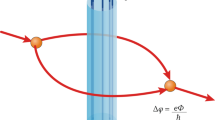Abstract
THE ancients were for the most part content to regard the universe as a theatre which had been specially constructed for the drama of human life. Men, and even the gods that man had created in his own image, came, lived, and disappeared after strutting their tiny hour upon a stage to which the eternal hills and the unchanging heavens formed a permanent background. While some thought was given to the birth of the universe, and its creation or emergence from chaos, very few thought of it as living its life and passing from birth to death in the same way as a man or a tree passes from birth to death.
This is a preview of subscription content, access via your institution
Access options
Subscribe to this journal
Receive 51 print issues and online access
$199.00 per year
only $3.90 per issue
Buy this article
- Purchase on Springer Link
- Instant access to full article PDF
Prices may be subject to local taxes which are calculated during checkout
Similar content being viewed by others
References
"The Earth", p. 83.
Phys. Zeitsch., 18, 122; 1917.
Zeitsch. f. Physik., 41, 711; 1927.
Astrophys. Jour., 64, 368; 1926.
Rights and permissions
About this article
Cite this article
JEANS, J. The Physics of the Universe1. Nature 122, 689–700 (1928). https://doi.org/10.1038/122689a0
Issue Date:
DOI: https://doi.org/10.1038/122689a0
Comments
By submitting a comment you agree to abide by our Terms and Community Guidelines. If you find something abusive or that does not comply with our terms or guidelines please flag it as inappropriate.


